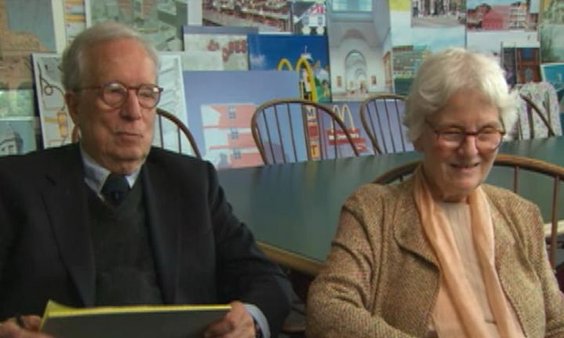NEXT STORY

Quotes and the standing of architects in England
RELATED STORIES

NEXT STORY

Quotes and the standing of architects in England
RELATED STORIES



[RV] Competitions are usually judged by a jury of several people and, very often, Denise has pointed out, very often four people like one scheme very much and four people like another scheme very much and then they can’t come to a conclusion, so they take the scheme that the fifth person likes, which is sort of what neither of them likes or something. So competitions really can have… can be difficult.
[DSB] They chose their second choice.
[RV] Second choice, yes.
[DSB] Everyone’s second choice.
[RV] Because committees… I think, judging art via a committee has real problems and is not generally a good idea. So that competitions can end up positively but they often cannot… can end up not positively. By some miracle this one, in a way, ended up positively. But then again the committee that represented the client while we were working, that did involve some problems that Denise has just described.
[DSB] There’s also another problem with competitions that you are forced to work away from your client…
[RV] Right, that’s very important.
[DSB] At the very time when you should…
[RV] Exactly.
[DSB] Be collaborating with them most closely…
[RV] Exactly.
[DSB] Before things are firmed up in your minds or theirs. And that’s the time to be… keep the design fluid, meet with them often and really tailor it to their growing realisation of what they need. Because, as you work together, their ideas of what they need change when they see how much… what they need costs for one thing. Then they begin to do trade-offs and the design might be different and the program might be different from the one you were given. In a competition you can’t do that. Well, this group simulated a more usual client relationship by coming and visiting us and we visiting them so that we had more opportunity to learn while we were designing what they wanted.
[RV] But that is… that is really the main reason why competitions can be bad because you want to have the opportunity to work together to make a good design. As I said earlier, Louis Kahn said, ‘A good piece of architecture derives from a good client’s role as a good architect’. I have a phrase which is a bit of an exaggeration, but not too much: We get our best ideas from our clients. We really do have to work with the client to come up with a good design and that is hard to do with a competition. But once you win the competition, then maybe you can begin to do that. But you might not win the competition and that’s a shame.
[DSB] Also…
[RV] So it’s very complex.
[DSB] Also, you build trust in that process. They see the way you work and they respect it. If they don’t see that process later on they think you didn’t listen to them, you didn’t hear them, you’ve had other ideas in your head. They get notions of being persecuted because they didn’t see that you were open and able to hear them.
Internationally renowned architects Robert Venturi (1925-2018) and Denise Scott Brown (b.1931) have helped transform contemporary design through their innovative architecture and planning. Winners of numerous prestigious awards, their designs have championed multiculturalism, social activism, symbolism, pop culture, history and evolving technologies.
Title: The difficulties of competitions
Listeners: Thomas Hughes
Thomas Hughes is Mellon Professor Emeritus of the History of Science at the University of Pennsylvania and Distinguished Visiting Professor at the Massachusetts Institute of Technology. His most recent books include Human Built World, Rescuing Prometheus and American Genesis. He is a member of the American Philosophical Society, US National Academy of Engineering, Royal Swedish Academy of Engineering Sciences and the American Academy of Arts and Sciences.
Duration: 2 minutes, 57 seconds
Date story recorded: 22nd to 23rd September 2006
Date story went live: 27 May 2010